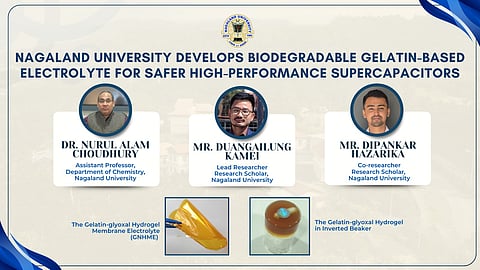

Nagaland University has unveiled a patented biodegradable electrolyte that could reshape the future of high-performance energy storage. The research team has designed a KI-doped glyoxal-crosslinked gelatin hydrogel membrane electrolyte — a flexible, eco-friendly material that replaces the hazardous liquid electrolytes traditionally used in supercapacitors.
Supercapacitors are key to powering electric vehicles, medical devices, and renewable energy systems, yet their conventional electrolytes risk leaks, corrosion, and pollution. The Nagaland team’s innovation, published in Materials Today Chemistry (Impact Factor 6.7) and granted Indian Patent No. 570983 on September 22, 2025, blends gelatin, a biodegradable protein, with glyoxal for flexibility and potassium iodide (KI) for enhanced ionic conductivity and capacitance.
This semi-transparent hydrogel safely conducts ions while maintaining stability through thousands of charge–discharge cycles. It has already powered LED lamps for extended durations, demonstrating readiness for practical use. The material absorbs water up to 717 %, ensuring high electrochemical efficiency and leak-proof operation — a major advance for solid-state energy systems.
Vice-Chancellor Prof Jagadish K Patnaik hailed the innovation as proof of Nagaland University’s commitment to sustainability, while principal investigator Dr Nurul Alam Choudhury described it as “an important step toward realising eco-friendly, high-performance energy storage systems”. Lead researcher Duangailung Kamei noted that the team is now optimising dopant levels and scaling fabrication for commercial testing.
Funded by the University Grants Commission (UGC), Science and Engineering Research Board (SERB), and the Ministry of Tribal Affairs, the project positions Nagaland University among India’s rising contributors to clean-energy technology.
